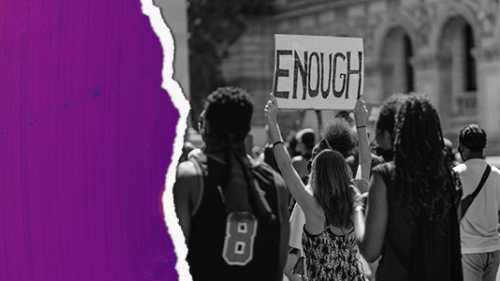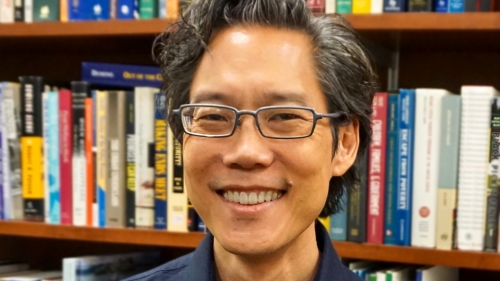
Contemporary social science research has done mighty work to help society better understand where and why inequality exists and how it affects individuals, families, and communities. The next logical step—taking those findings and turning them into action through policies and programs—can be a bit trickier from a research perspective.
A recent online forum hosted by Steinhardt’s Institute of Human Development and Social Change, “From Understanding Inequality to Reducing Inequality,” explored the potential of research to help build and strengthen efforts to address inequality, as well as delineate pathways through which research may lead to large-scale social change.
The event was also co-sponsored by the Stone Center on Socio-Economic Inequality at the Graduate Center at the City University of New York (CUNY), the Center for the Study of Wealth and Inequality at Columbia University, and the William T. Grant Foundation.
“So much of the social science of inequality is to understand its extent, its sources, and its terrible consequences,” said Adam Gamoran, president of the William T. Grant Foundation (a strong research partner of Steinhardt’s), and moderator of this virtual event. “But we think that social scientists can do more to actually reduce inequality, and that is our focus today.”
The forum discussed two William T. Grant Foundation papers published in a new Special Collection of Socius: Sociological Research for a Dynamic World, which explores ways for social scientists to move beyond describing and quantifying the problem of inequality and to focus instead on ways to reduce it. The two papers took slightly different approaches on how social science research can create more real-world outcomes to affect inequality.
“The Relevance of Inequality Research in Sociology for Inequality Reduction” by Thomas DiPrete, Columbia University, and Brittany Fox-Williams, Lehman College, CUNY, posits that inequality scholars need to undertake more feasibility research to both enhance the value of frame-shifting research and identify attainable approaches to improving lives and communities.
“Frame-shifting research challenges conventional wisdom and encourages social transformation, a necessary step on the path toward inequality reduction,” said Fox-Williams. “But it is not enough without feasibility research, which aims to provide practical strategies for reducing inequality in the absence of large-scale social change, bridges frame-shifting and policy research, and helps actualize the goals of frame-shifting research.”
Some of the strategies outlined include:
- shifting the culture of the field in a more optimistic direction in which researchers are continuously asking themselves what they need to know to be able to design more equitable and effective social policies; and
- the adoption in the discipline of more explicit reward structures that value the bridging of explanatory social science and social policy research.

The second paper, “Social Science-based Pathways to Reduce Social Inequality in Youth Outcomes and Opportunities at Scale,” was authored by Andrew Nalani, doctoral candidate in applied psychology at Steinhardt; Hirokazu Yoshikawa, the Courtney Sale Ross University Professor of Globalization and Education at Steinhardt; and Prudence Carter, UC Berkeley.
The article delineates six pathways for the kind of research that may generate reductions in youth inequalities of different kinds—including distributional and relational—at scale:
- research in the pragmatic and social processes of policy making
- research on the societal monitoring of inequality
- bring data on inequality of opportunity, not just outcomes into the policy process
- contribute research to legal cases and actions that aim to reduce distributional and relational inequality
- delineate and counter the mechanisms that enhance the power of elite institutions
- create or strengthen a social movement or civil society organization that brings evidence into advocacy and policy making
The authors conclude with a set of proposals for what academic institutions can do to train and support researchers to carry out this research agenda, including the creation of more equitable research-practice partnerships and prioritization of inter- and/or transdisciplinary approaches.
With these more concrete strategies put forth, the authors and other forum participants discussed the possibilities—and barriers—for ways in which social science research can make a strategic turn from theory to action. Considerations included looking to efforts in other countries as models for the U.S., how hands-on work with the disenfranchised can interplay with scholarly research, and how academic institutions may need to change their programs to prepare scholars for actionable work on the reduction of inequality.
“Inequality in my mind is the greatest and most urgent problem of our time,” said Elise Cappella, Steinhardt’s vice dean for research, in her remarks during the forum. “For a long time, social science has generated evidence about why there is inequality, how much there is, and how that varies across settings, people, and changes over time. … Today we also learned how social science research can help us to know what to do about this most serious issue.”
“We’re in a new time of reckoning right now, dealing with deep, persistent stains on our society: the legacy of colonialism, racism, white supremacy, mounting economic equality, persistent gaps in opportunity, broken social trust, and tattered public discourse,” echoed Erin Godfrey, director of the IHDSC, in her closing remarks. “Social science has taught us a great deal about how to understand these inequities, but what we’ve highlighted here today is that it’s not enough to know. We must act in order to heal.”
